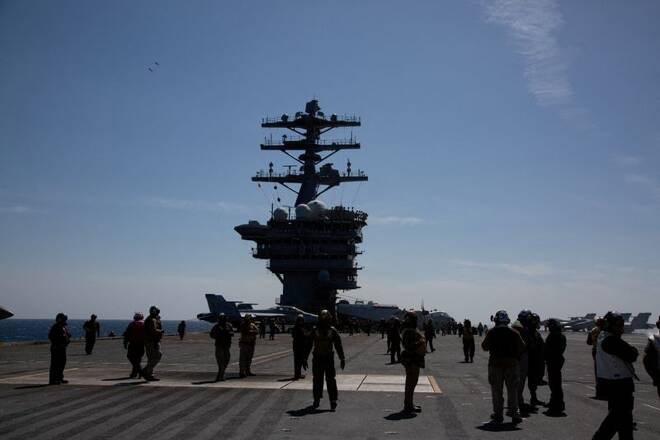Advertisement
Advertisement
South Korea, US, Japan hold anti-submarine drills to counter North Korea threats
By:
SEOUL (Reuters) - The navies of South Korea, the U.S. and Japan will hold two days of anti-submarine exercises starting Monday to better counter North Korea's evolving nuclear and missile capabilities, South Korea's defence ministry said.
SEOUL (Reuters) – The navies of South Korea, the U.S. and Japan will hold two days of anti-submarine exercises starting Monday to better counter North Korea’s evolving nuclear and missile capabilities, South Korea’s defence ministry said.
The drills will be staged in international waters off South Korea’s southern island of Jeju, involving a U.S. carrier strike group led by USS Nimitz, which had arrived in the southeastern city of Busan last week.
The trilateral drills come as North Korea unveiled last week new, smaller nuclear warheads, vowed to produce more weapons-grade nuclear materials to expand its arsenal, and boasted of what it called a nuclear-capable underwater attack drone.
This week’s exercises will use a mobile anti-submarine warfare training target to improve the capabilities needed to detect, track and destroy North Korean underwater threats, the ministry said.
Japan’s top government spokesperson, Hirokazu Matsuno, told reporters that the drills are meant to promote trilateral cooperation to “deal with regional security concerns, protect our shared security and prosperity and show the three countries’ commitment to strengthening the rule-based international order.”
Asked about the drills on Monday, Chinese foreign ministry spokesperson Mao Ning said: “The drills conducted by some countries around the peninsula are the main reason for the high tensions on the Korean peninsula. Relevant parties should create favourable conditions for the resumption of dialogue.”
The three countries last held trilateral anti-submarine drills in September – the first time in five years – amid tension over North Korea’s unprecedented number of missile tests.
(Reporting by Soo-hyang Choi; Additional reporting by Kantaro Komiya in Tokyo and Andrew Hayley in Beijing; Editing by Gerry Doyle)
About the Author
Reuterscontributor
Reuters, the news and media division of Thomson Reuters, is the world’s largest international multimedia news provider reaching more than one billion people every day. Reuters provides trusted business, financial, national, and international news to professionals via Thomson Reuters desktops, the world's media organizations, and directly to consumers at Reuters.com and via Reuters TV. Learn more about Thomson Reuters products:
Advertisement
